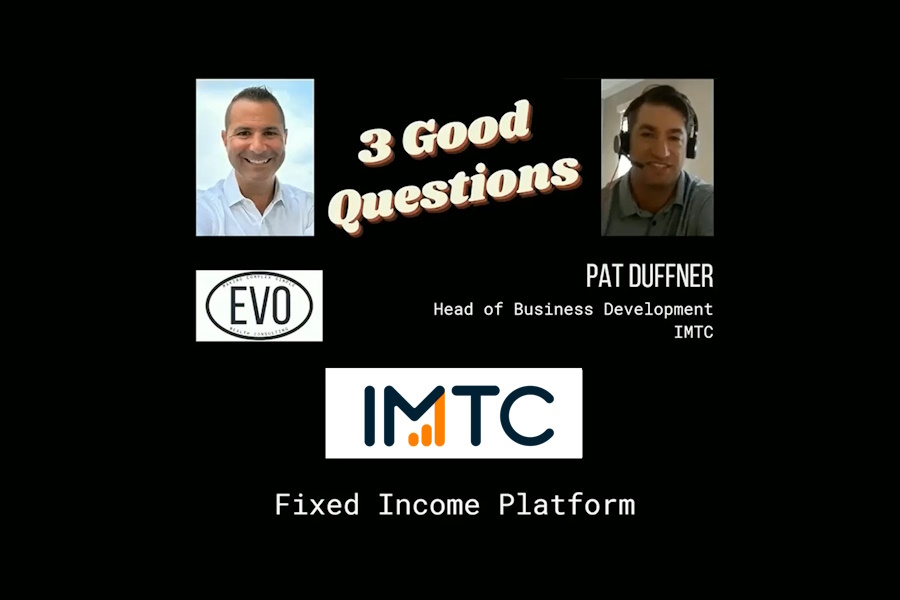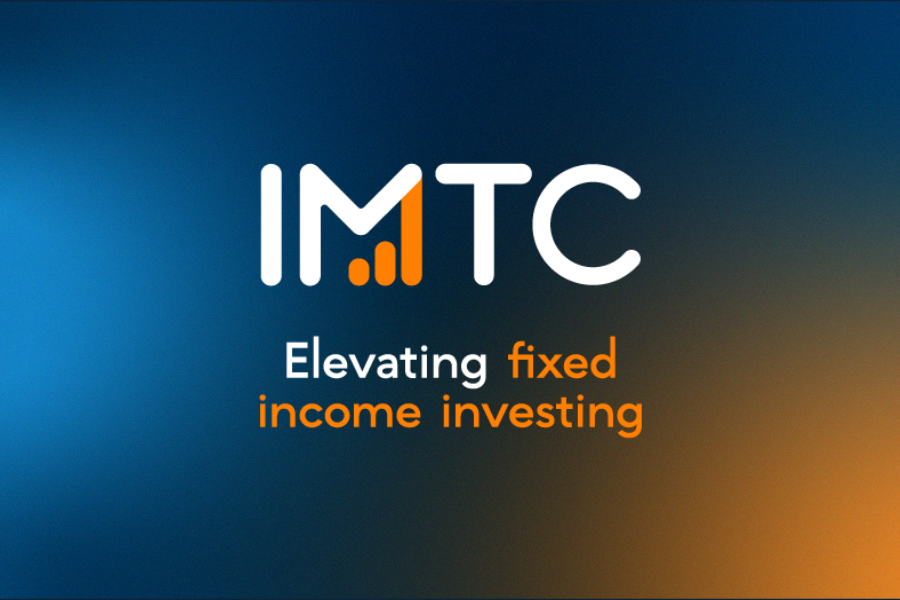Patrick Duffner featured on 3 Good Questions from EVO Wealth

This week, IMTC’s Patrick Duffner sat down with Mike Casciano of EVO Wealth Consulting for an episode of 3 Good Questions.
3 Good Questions is a ten-minute conversation with innovative leaders in wealth tech and wealth management to discuss common challenges and potential solutions for the client service experience.
In this episode, Pat Duffner, Head of Business Development for IMTC, discusses how wealth managers are tailoring client portfolios through adaptive stock and bond allocations. IMTC empowers advisors to incorporate individual bonds, based on client specific needs, easily and at scale through their turnkey portfolio and order management system.
Listen to 3 Good Questions here.
EVO Wealth Solution Guide
EVO Wealth Consulting introduced the Wealth Technology Solution Guide, created in partnership with 22 leading wealth technology solutions. This initiative aims to help financial advisors, RIA firms, and broker-dealers navigate the evolving and complex landscape of wealth technology. IMTC has been included on the Wealth Technology Solution Guide since its inception.
Podcast Transcript
Mike Casciano (MC): Hi. Welcome back to another Three Good Questions. Today, we’ve got Pat Duffner, Head of Business Development for IMTC. And Pat, welcome to the show.
Pat Duffner (PD): Thanks, Mike. Appreciate you having me on.
MC: Absolutely. So, IMTC does some really interesting things with fixed income. So, let’s talk some fixed income. Just in general, with rates moving up, we’ve seen a lot of volatility. Maybe they’re coming back down. How are you seeing that impact fixed income allocations for portfolio managers and wealth managers?
PD: Sure. Yeah, I think fixed income is back in Vogue, which is nice. And there’s definitely a renewed demand, and that could be attributed to the higher yields. After many years of low yields and low total returns, I think right now you’re seeing a lot of advisors look at their clients’ balance sheet and say, there’s definitely a use case for fixed income. So, over the past 10 to 20 years, we were seeing kind of a secular decline in fixed income allocation, and that’s definitely been renewed and has come back up. So, the 60-40 portfolio went to a 70-30 to an 80-20 to, hey, why do we even have fixed income? To going back to closer to that 60-40 portfolio. So, I think it makes a lot of sense. I think the main driver has been yields, and I think we look at yields. There’s two things, there’s two benefits that the advisor is pointing to for their end client, which is one, income generation. I think first you saw people kind of tip their toes in the fixed income. Let me buy some T-bills. And, okay, T-bills are around 5%. This is great. I don’t love equities right now. Let me buy some T-bills. And I think the good advisors were able to talk to clients and say, okay, if you like 5% yields, why don’t we lock that in for longer? And that’s instant up a curve and really have a fixed income allocation that we’re going to rely on. A lot of clients have liked these yields, especially the taxable equivalent yields from munis, and it’s been a big benefit to the end client. And so now you have a portion of the client’s balance sheet returning good yield from their fixed income sleeve. And with that, with the higher yields, the hope is that there’s going to be a negative correlation with equities. So right now equities, the PE ratios are historically higher than they have been. So when we think about where do I invest that next dollar, people aren’t jumping out of their shoes to invest it into equities. But the idea is that the total returns of fixed income can be quite strong over the next five years. If we do see rates go down, if we do see a potential sell-off, you have that income and potentially price appreciation from the lower yields.
MC: Yeah, slim pickings for a long time, but, you know, nice, juicy 4-5%, relatively safe yields are hard to turn those down.
PD: Right. We’re excited as well.
MC: So, what are some of the opportunities for wealth managers when they’re looking to deliver a fixed income to their clients now?
PD: Yeah, I think, you know, in the past when, when portfolio manager wanted to put part of the asset allocation of the fixed income, it was historically through mutual funds. And so you choose some marquee mutual funds and invest there. I think that’s expanded over the past 15-20 years into ETFs and now individual bond portfolios, either in a SMA format or UMA format. And I think, you know, with the mutual fund, you get strong diversification and the same with the ETF, but it’s less customized and there’s less predictability of future cash flows. When you really buy a, you know, individual bond portfolio, you can tailor that investment to the end clients’ needs and you have reliable income and cash flows that you can predict. And that kind of the way that a high-net-worth client can rely on those cash flows and then also request that the portfolio meets their individual needs. It’s been a, it’s been a huge driver of both the UMA and SMA space. And I think that we expect that trend to continue because that really is the best for our end clients as well. And so we’re excited about that.
MC: Specifically, like, what is IMTC doing when it comes to helping advisors access bonds in a way that they can increase efficiencies or deliver better outcomes for clients?
PD: IMTC specifically helps fixed income SMA and UMA managers and the ability to offer these types of individual bond portfolios to your end client at scale that is both customizable and efficient has been what really, that is our goal for IMTC. And there’s risks associated with managing individual bond portfolios. And some of the things that we’ve seen where we’ve been most helpful in the past when you’re managing hundreds, if not thousands of different bond portfolios, one, the portfolios have a cash drag in it. They’re not getting reinvented quickly. And so one of the biggest things we see is that the cash drag in portfolios decreases quite significantly when you use a technology like ours. Second, I can’t tell you how many clients we onboard and their portfolios are underweight their duration targets or they’re not in line with their targets. And that’s just because you don’t really have the technology to manage your portfolios to your best ideas. And so not only are we reducing cash drag, but then these portfolios are more in line with the risk characteristics that they want to have. And so that’s going to be extremely important for the firm to be able to tell to their end clients. But also if the end client says, hey, I have needs around tax time, or I’m a Pennsylvania resident in the past I really wasn’t able to get a portion of PA municipal bonds of my portfolios through a mutual fund. Now an SMA can take all those customizations and needs and really provide that to the end client and they can get the best taxable equivalent yield that reflects their own risks and needs.
MC: Absolutely. So, and just kind of if we think about the overall, I think we’ve seen some advancements in advisors being able to kind of take like an LDI type of approach. I mean, and you really need to do that with individual bonds. I think the ability to blend some of these into an efficient portfolio, whether it’s taxable or tax free. I mean, can you talk about some of the ways that they’re utilizing your solution to help them drive that?
PD: I think you’re absolutely right. The LDI solution has been thought of as an institutional type of SMA solution. And the reality is for the same reason why it’s a benefit to a large institution and using their predicted cash flows to reinvest into their portfolio, it’s the same benefits for an individual portfolio, an individual end client. And the technology can just kind of take you into those future cash flows and your cash needs and also your potential cash influxes and be able to produce a portfolio that best fits those types of needs. A lot of our clients leverage their portfolio like a high-power checking account, which the fixed income PMs don’t love, but it’s the reality of the situation that this is thought of as the first line of cash raise potential. The ability to adhere to these cash raises and do so efficiently for the end client and still manage and meet those risk parameters that they’re looking to target, has been a huge benefit of the platform. But I think in general, you also mentioned where are people going as far as taxable equivalent yield. You mentioned munis specifically. The ability to say, hey, I can offer you a new strategy. That’s not just a muni portfolio. This is a taxable equivalent yield portfolio. Right now, if we like corporates or we like Treasuries, we don’t need to invest in munis. We’re going to give you the best return or best yield as we can at the given time. And so I think you said it absolutely right, where it’s a new strategy and the ability to offer new strategies, I think is extremely important right now because that’s what the end client really wants is a tailored solution.
MC: Yeah, 100 percent. We like customization, personalization, but we love it even more when it’s easy to deliver and do. And I think IMTC has a lot of tools for that. So let people know, like how do they find out more about you or maybe schedule a follow-up for a demo?
PD: Sure, yeah, I mean, you can always go onto our website, imtc.com, and we’ll love to talk to you. You can reach out to me directly, pdu@imtc.com. We’re always happy to speak with new people and just give you insight on how other people are tackling this problem. And at the very least, I think it will be insightful.
MC: Awesome. Pat, listen, thanks a lot for joining us. I appreciate having you on and really looking forward to see what you guys are able to do on go forward and kind of disrupting the space of what has been very, very limited, I think, access to how do you manage individual bonds. So we love everything you do.
PD: Well, thanks, Mike. We love what EVO Wealth is doing as well. So we appreciate it. Awesome.
MC: All right, thanks. Have a great day.
About EVO Wealth Consulting:
EVO is an activation consultant that is positioned at the intersection of wealth management, advisor technology and asset management firms. EVO helps wealth managers build differentiated client service platforms that are simple to implement and easy to use. EVO introduces existing third-party technologies and solutions that increase growth and reduce complexity. The result is an open architecture consulting relationship that adapts to a wealth manager’s needs through time.
Learn more about EVO Wealth here.
.





